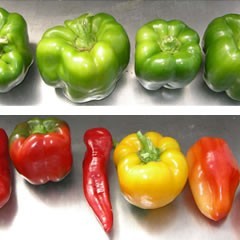Current Projects

Final reports and results of our research can found throughout this site. But, because some of our work can span several years to gather information, review and summarize our findings, we want to keep you abreast of our current projects. Check back for updates on our progress.
Relevant Events
African Eggplant Participatory Breeding Kick-Off
March 5, 2026
2026 Rochester Urban Agriculture Conference
March 21, 2026
Rochester, NY
New York State Urban Growers Pest Management Needs Assessment
Lori Koenick, Extension Support Specialist
Cornell Vegetable Program

As part of a multi-year project exploring non-spray pest management options that are economically and environmentally sustainable for urban farms, we conducted a needs assessment with urban growers across New York State. This publication presents findings on current pest management practices, challenges, and topics of future interest.
2024 WNY Sweet Corn Pheromone Trap Monitoring

Again this year, the Cornell Vegetable Program will be collaborating with the NYS Integrated Pest Management Program to monitor the flights of European corn borer, Corn ear worm, fall armyworm and western bean cutworm. This information is used by NYS IPM to create weekly reports providing scouting and threshold information for fresh market sweet corn and links to resources on the major sweet corn insect and disease pests. Additionally, the information is used by the Cornell Vegetable Program to advise dry bean growers of the threat of western bean cutworm to their crop.
Muck Onion "Research Scouting" Program
Christy Hoepting, Extension Vegetable Specialist
Cornell Vegetable Program

To keep our fingers on the pulse of insect and disease pressure in muck onion production in our supporting counties, CVP Onion Technicians scout a handful of fields weekly counting disease lesions and onion thrips. Scouting reports are sent to grower cooperators complete with Cornell recommendations. This is a way of evaluating effectiveness of pest management programs, as well as a means of helping onion growers to implement onion IPM by spraying for pests only when they need to be.

Upcoming Events
African Eggplant Participatory Breeding Kick-Off
March 5, 2026
Join us to learn about the Cornell African Eggplant Research Project and learn how you can participate! African eggplant, also known as Bitterball, Garden Egg, Kittley and other names, is an important crop for many members of our community with heritage from regions such as sub-Saharan Africa, Southeast Asia, and Brazil. Since 2024, the Cornell African Eggplant Research Project has been collaborating with growers and community partners across New York to develop high-quality varieties adapted to the Northeast U.S. In this meeting, we will share information about growing and preparing African eggplant, highlight our research to date, and invite partners to collaborate with us in our 2026 participatory breeding and variety selection efforts.
COST: FREE! You must pre-register to receive the Zoom link.
Managing the Invasive Swede Midge Webinar
March 6, 2026
Swede midge is an invasive fly that causes serious economic losses to brassica crops. Due to its small size and hidden feeding habits, swede midge is often called an "invisible pest" and damage may be misdiagnosed. In this webinar, we will review the swede midge life cycle and crop damage symptoms, current management recommendations, new research findings, and highlights from on-farm case studies with a focus on organic management.
1.75 DEC pesticide recertification credits in categories 1a, 10, and 23.
Good Agricultural Practices (GAPs) Food Safety Training
March 10, 2026
Newark, NY
Learn about food safety on the farm! This event hosted by the Cornell Vegetable Program, Cornell Lake Ontario Fruit Team, CCE Wayne County, and the NYS Department of Agriculture, will cover good agricultural practices (GAPs) to help reduce the risk of microbial contamination on the farm, keeping food and consumers safe.


































